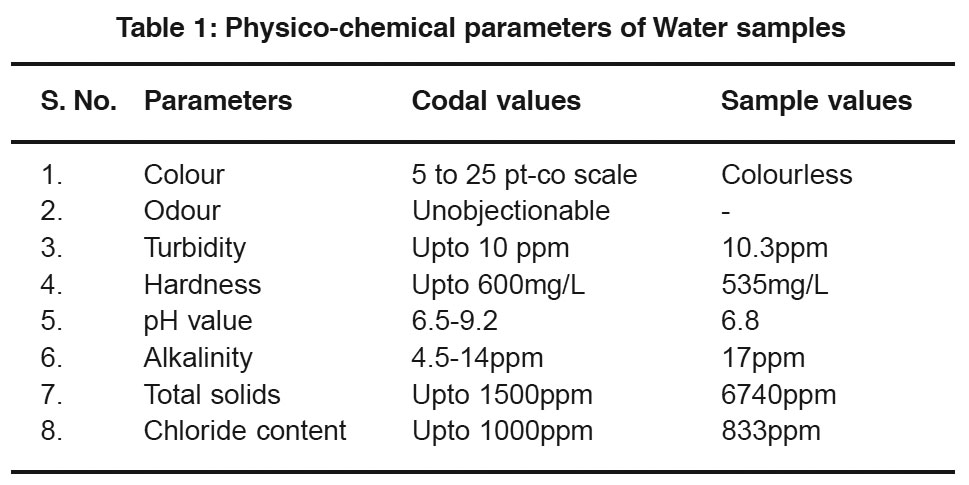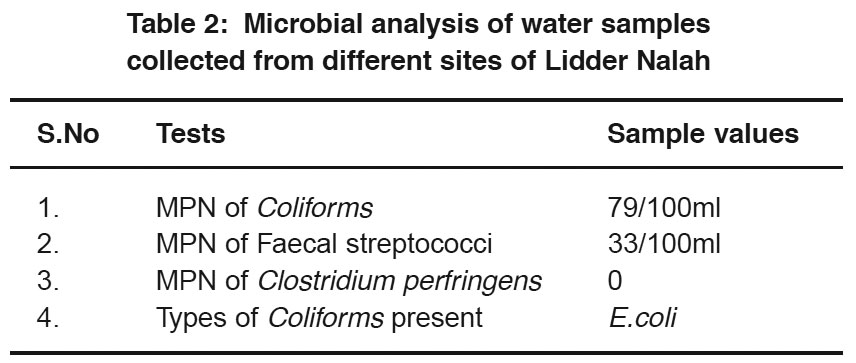Water quality analysis of Lidder Nalah in Kashmir Valley
S.A. Hajam1 * , Nassar Ahmad Wani1 and Nassar H.A. Wani2
1
National Institute of Technology Hazratbal,
Srinagar,
190 006
India
DOI: http://dx.doi.org/10.12944/CWE.3.2.23
Physical, Chemical and Bacterial analysis of water collected from different sites of Lidder Nalah revealed that water moderately contaminated and needs proper treatment before supply to the community.
Copy the following to cite this article:
Hajam S.A, Wani N.A, Wani H.A. Water quality analysis of Lidder Nalah in Kashmir Valley. Curr World Environ 2008;3(2):331-332 DOI:http://dx.doi.org/10.12944/CWE.3.2.23
Copy the following to cite this URL:
Hajam S.A, Wani N.A, Wani H.A. Water quality analysis of Lidder Nalah in Kashmir Valley. Curr World Environ 2008;3(2):331-332. Available from:http://www.cwejournal.org/?p=865
Download article (pdf) Citation Manager Publish History
Select type of program for download
| Endnote EndNote format (Mac & Win) | |
| Reference Manager Ris format (Win only) | |
| Procite Ris format (Win only) | |
| Medlars Format | |
| RefWorks Format RefWorks format (Mac & Win) | |
| BibTex Format BibTex format (Mac & Win) |
Article Publishing History
| Received: | 2008-05-23 |
|---|---|
| Accepted: | 2008-08-19 |
Introduction
Water is essential for sustaining life. It plays central role in the ground environmental health of cities and towns. People depend on water for more than just drinking, cooking and personal hygiene. Vast quantities are often required for industrial and commercial uses. Water resources are also essential for irrigation, power generation and navigation etc.
Pure water is never found in natural streams, lakes, oceans or under the ground as it has always some dissolved or suspended impurities within it. The degree of impurity or contamination depends upon the type and concentration of impurities as well as on the intended use of water. The concentration of dissolved and suspended substances has to be compared with water quality standards set for particular use. Therefore it is quite evident that water withdrawn from any natural source needs some degree of process of purification to render it fit for human consumption.
The treatment of water is required for a number of reasons of which the removal of germs causing diseases is the most important. The potable water should be free from unpleasant taste, odour and should have a good appearance.
Material and Methods
 |
Table 1: Physico-chemical parameters of Water samples Click here to view table |
Water samples were collected from different sites of Lidder Nalah. Care was taken in collection, carriage and time lapse between collection and testing of samples so that the parameters found out in laboratory were true representative of the water quality of the Lidder Nalah at the time of collection. The water samples were tested for colour odour, turbidity(Nephlometer), hardness, pH value (pH meter), alkalinity, total solids, chloride content and microbial analysis (SKAUST-K)
Results and Discussion
 |
Table 2: Microbial analysis of water samples collected from different sites of Lidder Nalah Click here to view table |
Water samples collected from different sites of Lidder Nalah had values of physio-chemical parameters different from normal values (table 1) and form the basis for treatment. Also microbial analysis revealed that water is moderately contaminated and needs proper treatment before supply to the community (table 2).
References
-
Water works Engineering by Syed R. Qasim, Edward M. Motley and Guang Zhu.
-
Water Supply Engineering by Dr. P.N. Modi.
-
Water and waste water Technology by Mark J. Hammer and Mark J. Hammer Jr.
-
Water supply and sanitary engineering by S.K. Hussain.
-
IS – 10500 – 1983 Specification for drinking water.
-
Laboratory manual for chemical and bacterial analysis of water.
-
Bacterial test done at S.K.University of Agricultural Sciences and Technology, Shuhama(Alusteng), Srinagar.
-
Environmental Engineering Lab. Department of Civil Engineering, NIT Srinagar







